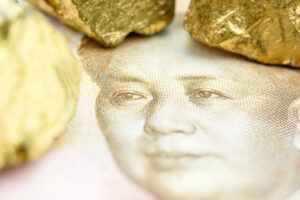The Shanghai International Gold Exchange And Its Role in De-Dollarization
The comments below are an edited and abridged synopsis of an article by Jan Nieuwenhuijs
This article is a primer on the Chinese gold market, more specifically the Shanghai International Gold Exchange (SGEI). The SGEI facilitates offshore gold trading in renminbi and can play a crucial role in de-dollarization, as it allows countries to use renminbi as a trade currency that can be converted into gold without affecting China’s balance of payments. De-dollarization can be accomplished by using yuan to settle international trade and store surpluses in gold through the SGEI.

Included in the article: Introduction; the Chinese domestic gold market; the Shanghai International Gold Exchange; China’s balance of payments, cross-border trade statistics, and SGE withdrawals; and conclusion.
“As demonstrated, gold trading in renminbi on the SGEI can be compared to offshore gold trading in the London Bullion Market with US dollars. As such, the SGEI is part of China’s ambitions to internationalize the renminbi to the detriment of the dollar.”
“Many commentators in the financial blogosphere state China’s closed capital account is holding back the offshore renminbi market from competing with the Eurodollar (offshore dollar) market. True, though PBoC swap lines promote the international use of renminbi, and as Zoltan Pozsar noted in the “In Gold We Trust 2023” report: ‘China has a swap line with everybody.’ With which he meant thirty-two counterparties.”
